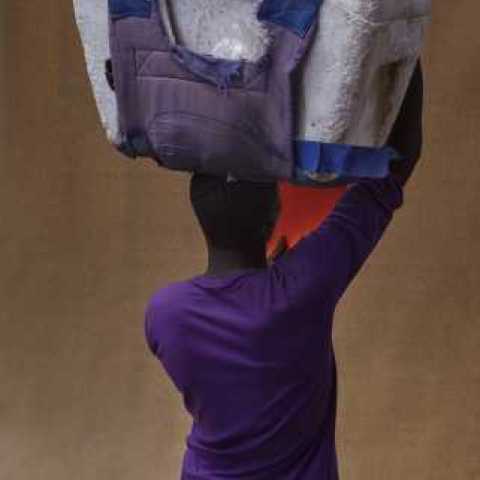Flowers Kingsland Road
82 Kingsland Rd
London
E2 8DP
United Kingdom

Flowers Gallery is pleased to announce a solo exhibition by London-based Italian artist Lorenzo Vitturi. The works in his new series Money Must be Made are based at the Balogun Market in Lagos, Nigeria, one of the largest markets of its kind in West Africa.
Located on Lagos Island, Balogun Market sprawls from street to street under the shadow of the now-unoccupied Financial Trust House. In its heyday, the twenty-seven storey Financial Trust building was the tallest on the island, housing western corporations and banks. While Vitturi’s previous project Dalston Anatomy reflected on the gentrification displacing local businesses in London, Vitturi explores the inverse situation in this particular area of Balogun Market, where its thriving business is causing global corporations to relocate.
Populated by tens of thousands of people each day, Vitturi describes the throng of Balogun market as a “sensory overload” of colour and noise. A large mural print on the central wall of the gallery shows an overhead image of the street market in full swing, commanding the rhythm of the surrounding exhibition. Vitturi went about foraging for materials, photographing the objects he found - from prayer mats, beads, household products and man-made plastic goods imported from China, to Calabash and Agbe gourds, snails, hooves, and horns - within small sets he constructed within the market. Returning to the studio with the materials he had gathered, Vitturi created teetering totemic assemblages with a Baroque sense of drama, collaging and overpainting his photographs and materials with high-register pigments, and often layering physical objects within the photographic assemblages to create new volumetrically disorientating images.
At the market’s core are its mobile street vendors, portrayed by Vitturi in a set of abstracted figure studies. He collaborated with a number of traders who posed in a makeshift outdoor studio at the base of the Financial Trust building. Photographing his subjects with their faces turned away from the camera, and using textiles sourced from the market as a backdrop, the images highlight the radical transformation of the figure by means of goods stacked and balanced on and around their bodies.
In contrast to the visual cacophony of Vitturi’s images of the market, photographs taken within the Financial Trust House allow moments of pause. Objects such as monitor screens and keyboards, plastic bottles and stacks of forgotten paperwork are set against the stark backdrop of empty offices, their tones unified almost to the point of monochrome by a thick layer of dust. Despite representing redundancy and decay, they retain a quietly assured aesthetic presence, like that of a Morandi still life. This fluctuation of tempo - switching from the lively colour-clash of the streets to the austere, muted photographs of discarded objects in the tower - reflects the complex relationship of global capital and local trade in one of Africa’s fastest growing urban centres. Phrases, calls and pronouncements by local vendors are transcribed in a series of hand-painted prayer mats produced in collaboration with a local artisan, forming slogans for the economic ethos of Balogun Market: “Oyinbo!!... Oyinbo Oyinbo...” / “It’s Like a Dream” / “Money Must be Made!”.
